- Home
- Joe R. Lansdale
The Big Book of Hap and Leonard Page 22
The Big Book of Hap and Leonard Read online
Page 22
“How’d she take Tom’s death?”
“Well enough. I think she just wanted to know what happened. She never expected him to come to any good, but she wanted to know, and now she does, and I think it was a relief.”
“Her health?”
“She won’t recover,” Frankie said, pushing her coffee cup away from her. “They say she’s got a few days at most. She comes around from the drugs about midday for a few hours. You can explain it all to her then.”
Marvin shook his head. “Nope. Me and Drake, we figure you were an idiot, but you didn’t really steal anything. And it was Mob money. And Jim was Mob, directly or indirectly.”
“He was still a human being.”
“But he’s a dead human being. You’re trying to do right, Frankie. You care about your mother-in-law. It’s a twenty-five-year-old crime. You haven’t stolen anything in the meantime, and if it’s any consolation, I believe your story.”
“Thank you,” Frankie said and reached out and touched Marvin’s hand.
He patted her hand and smiled. “I think it’s best we leave it alone from here on out. No one in town lost any money. The Mob made Jim and the two guards in on it pay, and that seems like a fitting end to all of it. I’ll try and see Mrs. Craver later today. But I won’t have anything new to add to what she knows.”
Frankie opened her purse and took out a check. She gave it to Marvin.
“Mrs. Craver signed this, told me to give it to you.”
Marvin looked at it.
“This is a lot more than we agreed to,” Marvin said.
“She wants you to have it. I want you to have it. Take it.”
“You’re sure?”
“I am. Mrs. Craver is.”
“All right then,” Marvin said. “That’s the end of my argument.”
That night at home, Rachel and Marvin had dinner. When they finished, Rachel said, “Want to watch some TV?”
“Sure.”
“We can surf the channels, see if there’s something interesting,” Rachel said.
“Sounds good.”
They went in the living room with glasses of ice tea and sat on the couch, Rachel on one end, Marvin on the other. They watched TV for a few minutes, and during a commercial, Rachel said, “What you told me about Mrs. Craver, about Frankie, not turning her in. That was the right thing to do.”
“I think so,” Marvin said.
Rachel slid over closer to Marvin and let her hand rest on top of his. “You’re a good man, Marvin.”
“Think so?”
“Stupid now and then,” Rachel said, “but at heart, a really good man.”
Marvin didn’t say anything to that, but he smiled. A little later he put his arm around Rachel’s shoulders, and she placed her head against his chest.
The Boy Who Became Invisible
A Story
The place where I grew up was a little town called Marvel Creek. Not much happened there that is well remembered by anyone outside of the town. But things went on, and what I’m aware of now is how much things really don’t change. We just know more than we used to because there are more of us, and we have easier ways to communicate excitement and misery than in the old days.
Marvel Creek was nestled along the edge of the Sabine River, which is not a wide river, and as rivers go, not that deep, except in rare spots, but it is a long river, and it winds all through East Texas. Back then there were more trees than now, and where wild animals ran, concrete and houses shine bright in the sunlight.
Our little school wasn’t much, and I hated going. I liked staying home and reading books I wanted to read, and running the then-considerable woods and fishing the creeks for crawdads. Summers and afternoons and weekends I did that with my friend Jesse. I knew Jesse’s parents lived differently than we did, and though we didn’t have money, and would probably have been called poor by the standards of the early sixties, Jesse’s family still lived out on a farm where they used an outhouse and plowed with mules, raised most of the food they ate, drew water from a well, but, curiously, had electricity and a big tall TV antenna that sprouted beside their house and could be adjusted for better reception by reaching through the living room window and turning it with a twist of the hands. Jesse’s dad was quick to use the razor strop on Jesse’s butt and back for things my parents would have thought unimportant, or at worst an offense that required words, not blows.
Jesse and I liked to play Tarzan, and we took turns at it until we finally both decided to be Tarzan, and ended up being Tarzan twins. It was a great mythology we created and we ran the woods and climbed trees, and on Saturday we watched Jungle Theater at my house, which showed, if we were lucky, Tarzan or Jungle Jim movies, and if not so lucky, Bomba movies.
About fifth grade there was a shift in dynamics. Jesse’s poverty began to be an issue for some of the kids at school. He brought his lunch in a sack, since he couldn’t afford the cafeteria, and all his clothes came from the Salvation Army. He arrived at history class one morning wearing socks with big S’s on them, which stood for nothing related to him, and he immediately became the target of James Willeford and Ronnie Kenn. They made a remark about how the S stood for Sardines, which would account for how Jesse smelled, and sadly, I remember thinking at that age that was a pretty funny crack until I looked at Jesse’s slack, white face and saw him tremble beneath that patched Salvation Army shirt.
Our teacher came in then, Mr. Waters, and he caught part of the conversation. He said, “Those are nice socks you got there, Jesse. Not many people can have monogrammed socks. It’s a sign of sophistication, something a few around here lack.”
It was a nice try, but I think it only made Jesse feel all the more miserable, and he put his head down on his desk and didn’t lift it the entire class, and Mr. Waters didn’t say a word to him. When class was over, Jesse was up and out, and as I was leaving, Mr. Waters caught me by the arm. “I saw you laughing when I came in. You been that boy’s friend since the two of you were knee-high to a legless grasshopper.”
“I didn’t mean to,” I said. “I didn’t think.”
“Yeah, well, you ought to.”
That hit me pretty hard, but I’m ashamed to say not hard enough.
I don’t know when it happened, but it got so when Jesse came over I found things to do. Homework, or some chore around the house, which was silly, because unlike Jesse, I didn’t really have any chores. In time he quit stopping by, and I would see him in the halls at school, and we’d nod at each other, but seldom speak.
The relentless picking and nagging from James and Ronnie continued, and as they became interested in girls, it increased. And Marilyn Townsend didn’t help either. She was a lovely young thing and as cruel as they were.
One day, Jesse surprised us by coming to the cafeteria with his sack lunch. He usually ate outside on one of the stoops, but he came in this day and sat at a table by himself, and when Marilyn went by he watched her, and when she came back with her tray, he stood up and smiled, politely asked if she would like to sit with him.
She laughed. I remember that laugh to this day. It was as cold as a knife blade in the back and easily as sharp. I saw Jesse’s face drain until it was white, and she went on by laughing, not even saying a word, just laughing, and pretty soon everyone in the place was laughing, and Marilyn came by me, and she looked at me, and heaven help me, I saw those eyes of hers and those lips, and whatever made all the other boys jump did the same to me . . . and I laughed.
Jesse gathered up his sack and went out.
It was at this point that James and Ronnie came up with a new approach. They decided to treat Jesse as if he were a ghost, as if he were invisible. We were expected to do the same. So as not to be mean to Jesse, but being careful not to burn my bridges with the in-crowd, I avoided him altogether. But there were times, here and there, when I would see him walking down the hall, and on the rare occasions when he spoke, students pretended not to hear him, or James would respond with some remark like, “Do you hear a
duck quacking?”
When Jesse spoke to me, if no one was looking, I would nod.
This went on into the ninth grade, and it became such a habit, it was as if Jesse didn’t exist, as if he really were invisible. I almost forgot about him, though I did note in math class one day there were stripes of blood across his back, seeping through his old, worn shirt. His father and the razor strop. Jesse had nowhere to turn.
One afternoon I was in the cafeteria, just about to get in line, when Jesse came in carrying his sack. It was the first time he’d been there since the incident with Marilyn some years before. I saw him come in, his head slightly down, walking as if on a mission. As he came near me, for the first time in a long time, for no reason I can explain, I said, “Hi, Jesse.”
He looked up at me surprised, and nodded, the way I did to him in the hall, and kept walking.
There was a table in the center of the cafeteria, and that was the table James and Ronnie and Marilyn had claimed, and as Jesse came closer, for the first time in a long time, they really saw him. Maybe it was because they were surprised to see him and his paper sack in a place he hadn’t been in ages. Or maybe they sensed something. Jesse pulled a small revolver from his sack and before anyone knew what was happening, he fired three times, knocking all three of them to the floor. The place went nuts, people running in all directions. Me, I froze.
Then, like a soldier, he wheeled and marched back my way. As he passed me, he turned his head, smiled, said, “Hey, Hap,” then he was out the door. I wasn’t thinking clearly, because I turned and went out in the hall behind him, and the history teacher, Mr. Waters, saw him with the gun, said something, and the gun snapped again, and Waters went down. Jesse walked all the way to the double front door, which was flung wide open at that time of day, stepped out into the light, and lifted the revolver. I heard it pop and saw his head jump and he went down. My knees went out from under me and I sat down right there in the hall, unable to move.
When they went out to tell his parents what had happened to him, that Marilyn was disfigured, Ronnie wounded, and James and Mr. Waters were dead, they discovered them in bed where Jesse had shot them in their sleep.
The razor strop lay across them like a dead snake.
The Boy Who Became Invisible
A comic book script based on the story of the same name
Note to artist: East Texas is not West Texas. No mountains. No deserts. No sand dunes. It’s a place of great pines and plentiful water in the form of creeks and rivers and man-made lakes. So do not think Texas of the movies, as East Texas is much closer in appearance to Louisiana and Arkansas. But most of the story takes place in a school and a schoolyard, places where that isn’t a concern. Jesse’s home should be on a wooded lot, and it isn’t so small as it is old.
Another note: This comic builds, and it’s not an action comic, and therefore could be designated as “talking heads” a lot, but I try to give it scenes and background that keep it interesting. I think the comic panels should reflect the alteration in Jesse’s state of mind, along with events and dialogue. This keeps a kind of slow burn more interesting, and then in the end it becomes more dynamic. Much of the strength of the piece is the build, and the tension the artist puts into panels.
First page or so sets up town and era and mood, some symbolic ideas to go with the captions.
All CAPTIONS are Hap’s internal dialogue.
Lastly, the artist may decide to change the size and number of panels, which is fine as long as the script is being properly conveyed. I like the artist to have freedom to create.
THE BOY WHO BECAME INVISIBLE
PAGE ONE
Four Panels
Panel One:
FIRST THIRD OF A PAGE
One end of the street looking down at—
View of a typical small East Texas town, one long main brick-street drag with buildings on either side, circa 1940s, though the story takes place in the 1960s. So keep that in mind. A couple of 1960s automobiles coast down the street, one toward us, one away from us.
CAPTION
I grew up in a little East Texas town called Marvel Creek.
Panel Two:
CAPTION
Not much happened there that will remembered outside the town and the surrounding countryside—
SECOND THIRD OF PAGE, AERIAL VIEW
View of the Sabine River, which is long, and muddy-colored and winding, but it’s rarely a wide river, so we will use a medium-size run of water as it hurtles under a high metal trellis bridge, and all along the water is bordered by tall trees, oaks and pines and hickories, and close to the shore, willows and a few shrubs.
Panel Three:
AVERAGE-SIZE LEFT-HAND PANEL.
CAPTION
—but more went on there than outsiders might suspect. Some of it as evil as a water moccasin bite on a blistering hot day . . .
Close-up on a water moccasin swimming in the river water.
Panel Four:
A DARK SKY and a long, nasty, brightly flaring lightning bolt.
CAPTION
. . . as unexpected and deadly as being struck by a blast of lightning.
PAGE TWO
Four Panels
Panel One:
MEDIUM PANEL
A schoolyard with young kids running and playing, the school behind them, a structure of red brick and shiny windows, circa 1950s style.
CAPTION
Our little school wasn’t much. And frankly, I preferred to stay home and read books.
Panel Two:
MEDIUM PANEL
CAPTION (1)
I pretended to be sick a lot.
CAPTION (2)
When I wasn’t reading books, I liked to run along the creeks and through the woods with my best friend, Jesse.
The woods with a little creek winding along through it, and running beside the banks of the creek are two boys about nine or ten. One is Hap, the narrator of our story; the other is Jesse. Hap is a nice-looking kid with an air of contentment. Jesse is a raw-boned, long-legged, ragged-clothed kid with greasy hair that falls in his face.
What we see in their faces is the youthful excitement of being alive.
Panel Three:
CAPTION
Jesse was a kid’s kid. He could juggle.
Jesse juggling rubber balls as Hap watches with surprise and delight.
Panel Four:
CAPTION
I couldn’t.
Hap dropping balls as he tries to juggle, a look of disappointment on his face.
PAGE THREE
Three Panels
Panel One:
CAPTION
He could walk on his hands.
Jesse doing just that, in perfect upright position, legs straight and high to the sky.
Panel Two:
Hap is attempting to walk on his hands. We see him with his head down and his legs bent and him toppling.
CAPTION
I couldn’t.
Panel Three:
HALF-PAGE PANEL
CAPTION
I knew Jesse’s family lived differently than we did. They were very poor. So were we. But compared to them, we were the Rockefellers.
Very important to give some of Jesse’s background, or at least how Hap sees it.
Hap and Jesse in tire swings side by side, swinging on ropes fastened to the tires and the limb of a huge oak.
Behind them we see a rundown shack with a porch to one side, and a leaning outhouse out to the left and some distance away from the house. There are old cars in the yard, tireless, wheel-less, up on blocks. Along with that, strewn about the yard, are overturned washing machines, hubcaps, and heaps of drying grass.
PAGE FOUR
Four Panels
Panel One:
DAY
CAPTION
And although my father couldn’t read or write, he was a raging intellectual compared to Jesse’s old man, Cletus.
SIDE VIEW AND MEDIUM-SIZED PANEL
J
esse’s old man, a classic peckerwood-cracker-son-of-a-bitch. He’s big, tall, and raw-boned like Jesse, but broad-shouldered with muscled arms. He’s wearing overalls and his hair is greasy and combed back Elvis-style with what was called a duck’s ass in the back—long, oily, flipped-up hair at the base of the neck. He is shirtless under the overalls.
Cletus has Jesse by the back of the neck, has his belt off and looped, and he’s beating Jesse like a drum.
Hap is standing off to the side, shocked.
SFX
Sound effect of Jesse caterwauling.
Panel Two:
CAPTION (1)
Cletus had the brain of a flea, the ambition of a frog, and the temper and savagery of a wounded bear.
CAPTION (2)
He could go off on Jesse for the slightest reason. Real or imagined.
MEDIUM-SIZED PANEL
Another angle on this scene. Jesse facing us, his old man behind him. His eyes are lit with anger or glee, a little of both, if that’s possible to present, and his arm is raised high, the belt coiled and ready to strike. Although we are showing the same thing as the panel before, I think seeing what’s going on twice and from a different angle affects the viewer more, and lets us really know how nasty Jesse’s home life is. But, if the artist wants to use these two panels to make several small panels to show what’s going on, that’s cool too. I’m for the artist using common sense.
Panel Three:
MOMENTS LATER, ANOTHER ANGLE
Jesse and Cletus, and in this scene Cletus is giving Jesse a good kick in the ass, sending him flying.
CAPTION
Cletus was a brutal old bastard.
Panel Four:
Hap is running by the front porch, away from Cletus’s home, and on the porch we see Cletus’s wife, a rundown middle-aged woman with black eyes.
CAPTION
He didn’t treat his wife or dogs any better. And as far as Jesse’s mother was concerned, he was on his own.

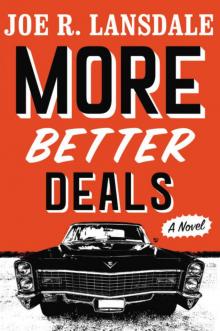 More Better Deals
More Better Deals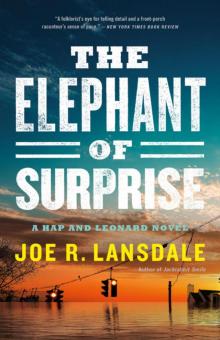 The Elephant of Surprise
The Elephant of Surprise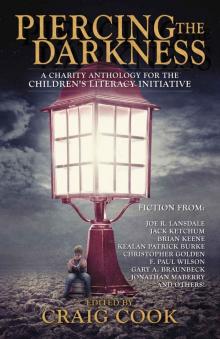 Piercing the Darkness: A Charity Horror Anthology for the Children's Literacy Initiative
Piercing the Darkness: A Charity Horror Anthology for the Children's Literacy Initiative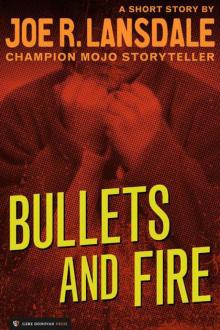 Bullets and Fire
Bullets and Fire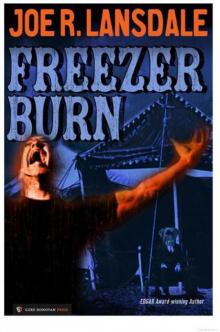 Freezer Burn
Freezer Burn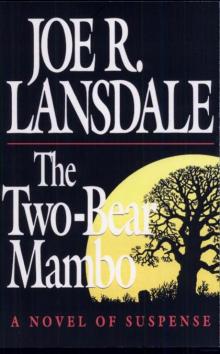 The Two-Bear Mambo
The Two-Bear Mambo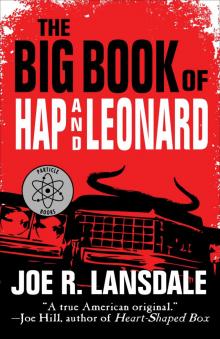 The Big Book of Hap and Leonard
The Big Book of Hap and Leonard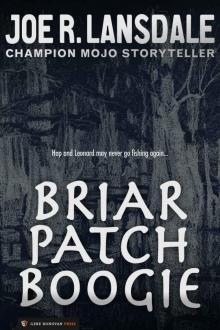 Briar Patch Boogie: A Hap and Leonard Novelette
Briar Patch Boogie: A Hap and Leonard Novelette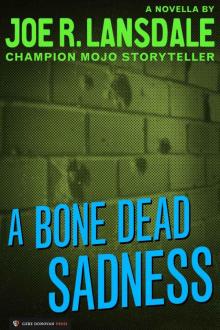 A Bone Dead Sadness
A Bone Dead Sadness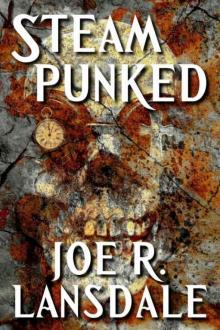 Steampunked
Steampunked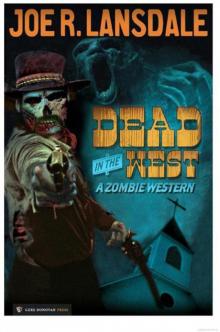 Dead in the West
Dead in the West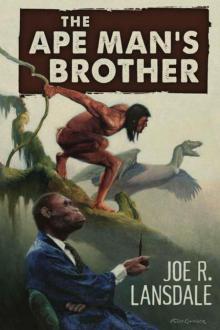 The Ape Man's Brother
The Ape Man's Brother The Bottoms
The Bottoms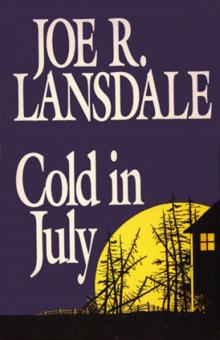 Cold in July
Cold in July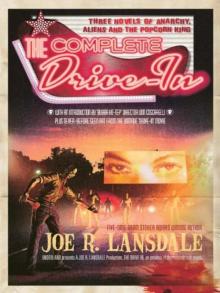 The Complete Drive-In
The Complete Drive-In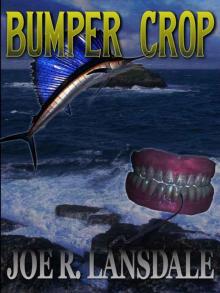 Bumper Crop
Bumper Crop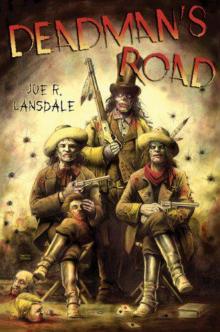 Deadman's Road
Deadman's Road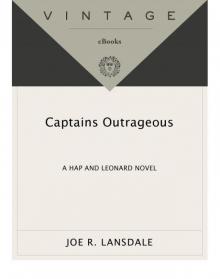 Captains Outrageous
Captains Outrageous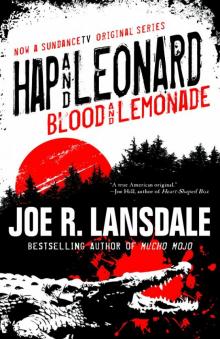 Hap and Leonard: Blood and Lemonade
Hap and Leonard: Blood and Lemonade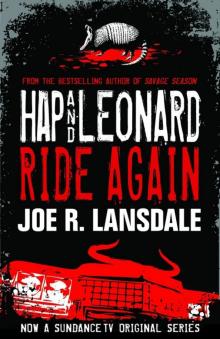 Hap and Leonard Ride Again
Hap and Leonard Ride Again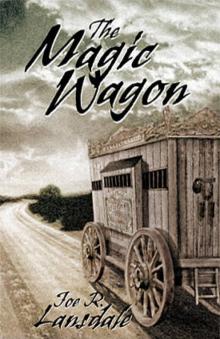 Magic Wagon
Magic Wagon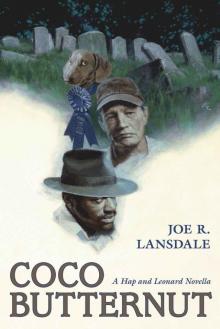 Coco Butternut
Coco Butternut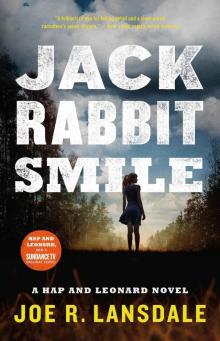 Jackrabbit Smile (Hap and Leonard)
Jackrabbit Smile (Hap and Leonard)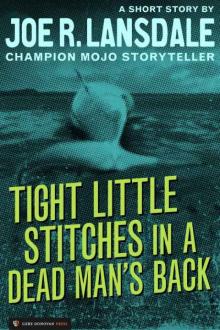 Tight Little Stitches in a Dead Man's Back
Tight Little Stitches in a Dead Man's Back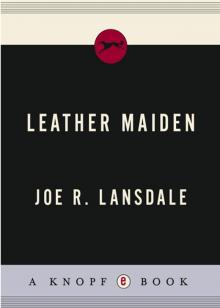 Leather Maiden
Leather Maiden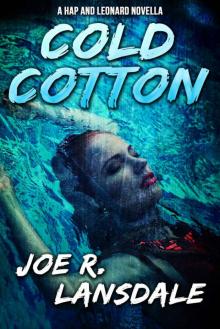 Cold Cotton: A Hap and Leonard Novella (Hap and Leonard Series)
Cold Cotton: A Hap and Leonard Novella (Hap and Leonard Series)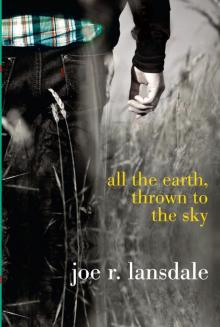 All the Earth, Thrown to the Sky
All the Earth, Thrown to the Sky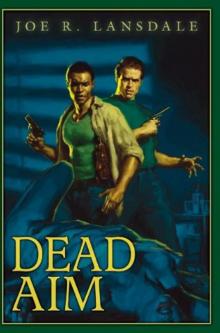 Dead Aim
Dead Aim Edge of Dark Water
Edge of Dark Water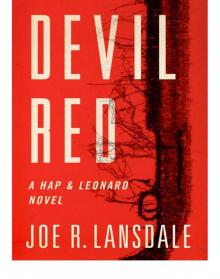 Devil Red
Devil Red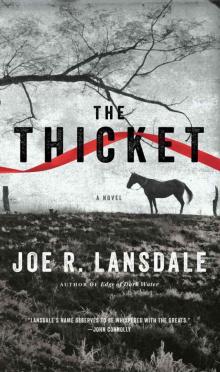 The Thicket
The Thicket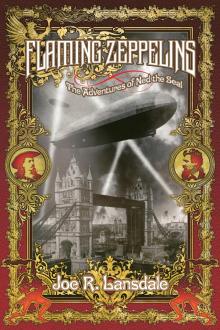 Flaming Zeppelins
Flaming Zeppelins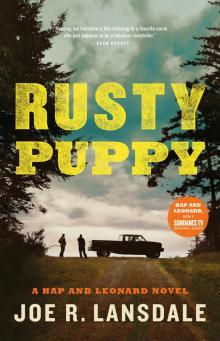 Rusty Puppy
Rusty Puppy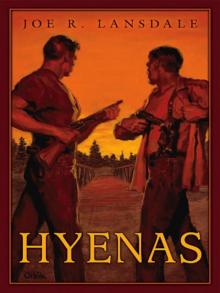 Hyenas
Hyenas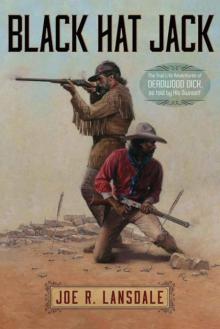 Black Hat Jack
Black Hat Jack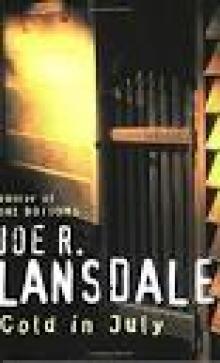 Rare Lansdale
Rare Lansdale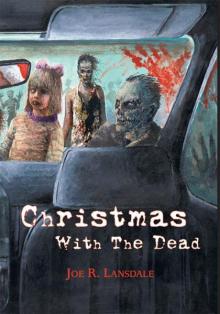 Christmas With the Dead
Christmas With the Dead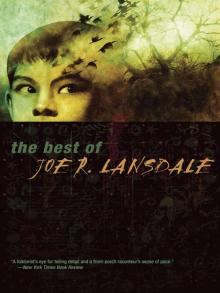 The Best of Joe R. Lansdale
The Best of Joe R. Lansdale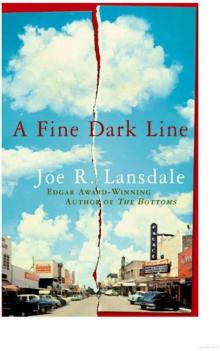 A Fine Dark Line
A Fine Dark Line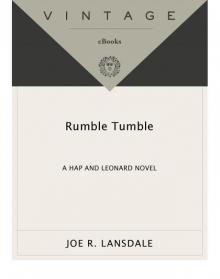 Rumble Tumble
Rumble Tumble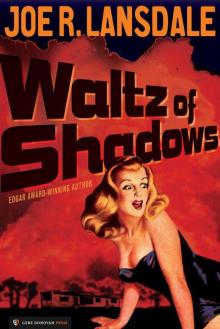 Waltz of Shadows
Waltz of Shadows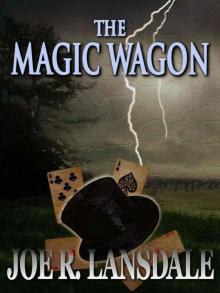 The Magic Wagon
The Magic Wagon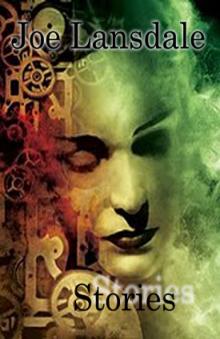 Stories (2011)
Stories (2011)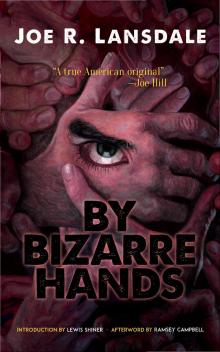 By Bizarre Hands
By Bizarre Hands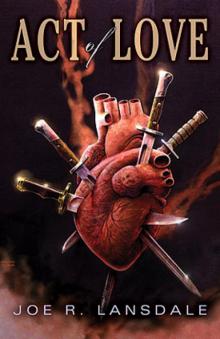 Act of Love (2011)
Act of Love (2011)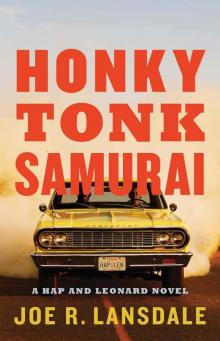 Honky Tonk Samurai (Hap and Leonard)
Honky Tonk Samurai (Hap and Leonard)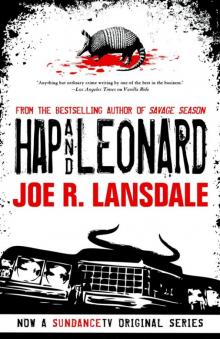 Hap and Leonard
Hap and Leonard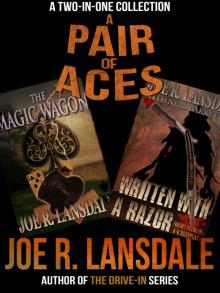 A Pair of Aces
A Pair of Aces Vanilla Ride
Vanilla Ride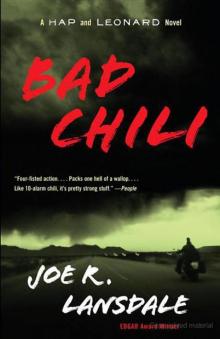 Bad Chili
Bad Chili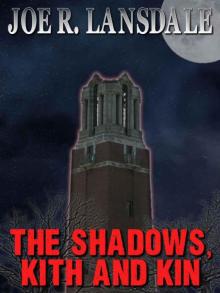 The Killer's Game
The Killer's Game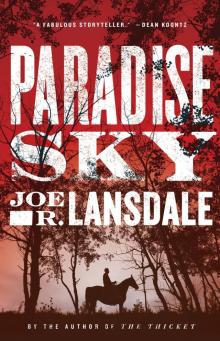 Paradise Sky
Paradise Sky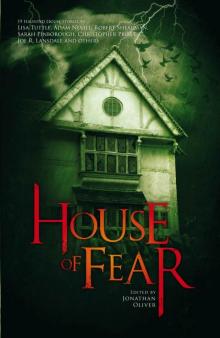 House of Fear
House of Fear Lost Echoes
Lost Echoes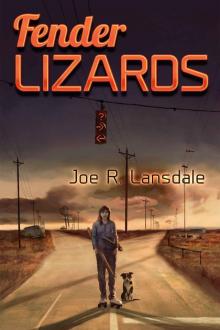 Fender Lizards
Fender Lizards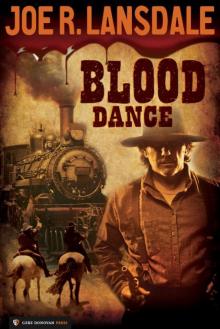 Blood Dance
Blood Dance Hot in December
Hot in December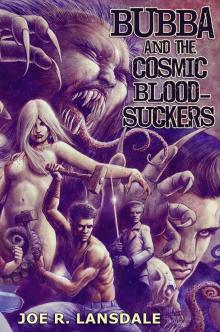 Bubba and the Cosmic Blood-Suckers
Bubba and the Cosmic Blood-Suckers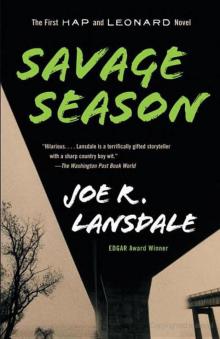 Savage Season
Savage Season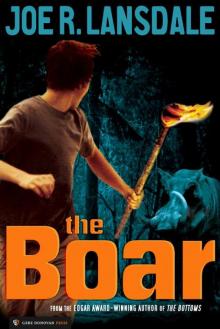 The Boar
The Boar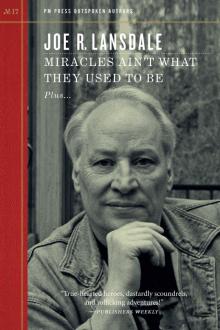 Miracles Ain't What They Used to Be
Miracles Ain't What They Used to Be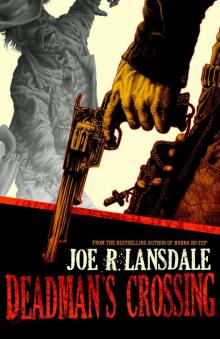 Deadman's Crossing
Deadman's Crossing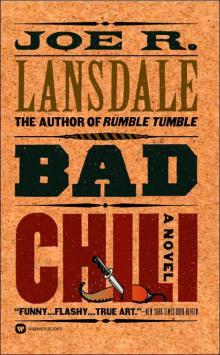 Bad Chili cap-4
Bad Chili cap-4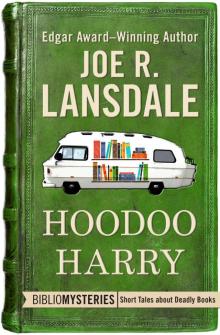 Hoodoo Harry
Hoodoo Harry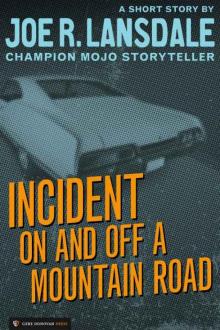 Incident On and Off a Mountain Road
Incident On and Off a Mountain Road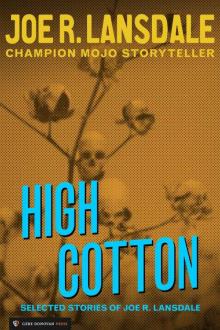 High Cotton: Selected Stories of Joe R. Lansdale
High Cotton: Selected Stories of Joe R. Lansdale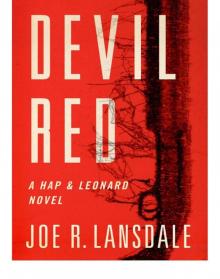 Devil Red cap-8
Devil Red cap-8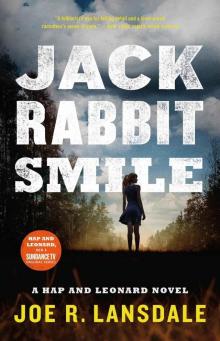 Jackrabbit Smile
Jackrabbit Smile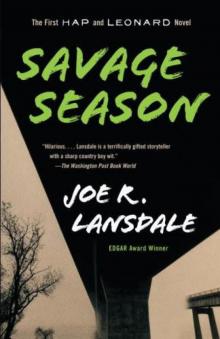 Savage Season cap-1
Savage Season cap-1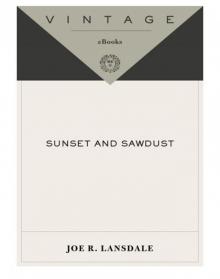 Sunset and Sawdust
Sunset and Sawdust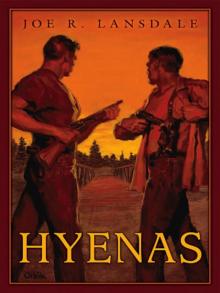 Hyenas cap-10
Hyenas cap-10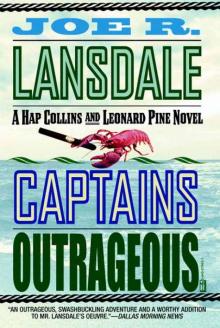 Captains Outrageous cap-6
Captains Outrageous cap-6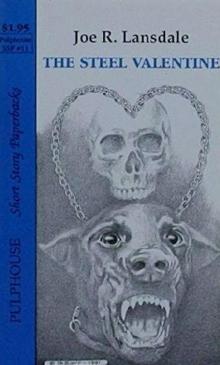 The Steel Valentine
The Steel Valentine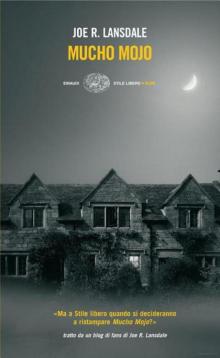 Mucho Mojo
Mucho Mojo Vanilla Ride cap-7
Vanilla Ride cap-7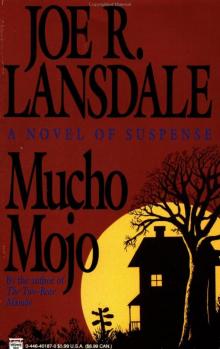 Mucho Mojo cap-2
Mucho Mojo cap-2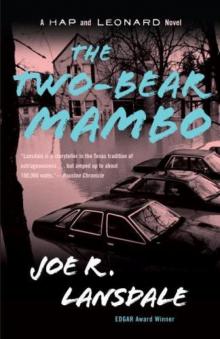 The Two-Bear Mambo cap-3
The Two-Bear Mambo cap-3